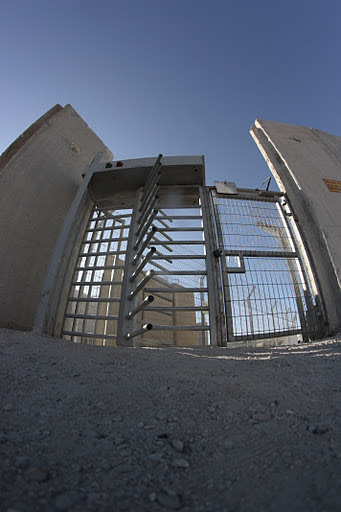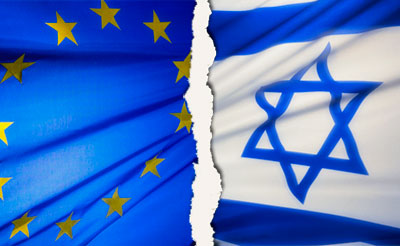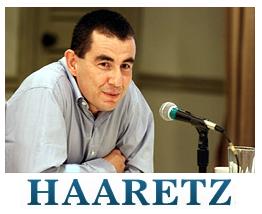For nearly a year and a half, the
Bedouin villagers of
al-Araqib in the Naqab (Negev) have been incessantly brutalized by the Israeli government and the
Jewish National Fund (
JNF) in an ongoing, broad-daylight ethnic cleansing operation.
The village has been razed to the ground approximately thirty times since July 2010, and yet, as The Electronic Intifada has reported, the villagers — who are Israeli citizens — remain steadfast by rebuilding, regrouping and resisting after each demolition.
Focusing especially on the courage and determination of al-Araqib’s women, young and old, as forefronts of the resistance, the new documentary film
Sumoud (steadfastness in Arabic) offers a valuable glimpse into the daily struggle of villagers to hold onto their land, their livelihoods and their heritage.
Nora Barrows-Friedman spoke with
Jillian Kestler-D’Amours — filmmaker, journalist and frequent contributor to The Electronic Intifada — about
Sumoud, which she filmed, edited, and directed for the Alternative Information Center (
AIC) in Jerusalem, and the ongoing struggle in al-Araqib.
Nora Barrows-Friedman: Tell us about the film,
Sumoud, what time period it encompasses and what it’s all about.
Jillian Kestler-D’Amours: Filming for
Sumoud started after the second demolition of the village, so at the end of July, beginning of August 2010. It tells the story of the Bedouin village of al-Araqib in the Naqab, near
Bir al-Sabe [Beer Sheva], to which on 27 July 2010,
the Israeli authorities sent 1,700 soldiers and police officers to destroy 45 structures and make 300 Israeli citizens homeless, including 200 children.
They uprooted olive trees and crushed livestock under bulldozers. It was a horrifying scene. So the film starts there — and looks at how since that time the village has been destroyed more than thirty times in the span of a year.
What’s interesting about the film is that some of the main village residents in the film are women. So it shows the struggle of this small village and how the residents, and especially the women, have been able to rebuild their homes and have really persevered against extreme Israeli state violence and destruction.
NBF: When was the last time that al-Araqib was destroyed?
JKD: The last time was a week or two weeks before Eid al-Adha [in November].
NBF: You’ve been going there for the last 17 months. As a filmmaker, as a journalist, what have been some of the most significant moments that you’ve witnessed since July 2010, not only making this film but going back time and time again and seeing the village destroyed, and really getting to know the community?
JKD: There are so many significant moments, many from different periods. And through these moments, you can see the impact on the residents — both incredibly devastating, of course, and also moments that encompass some of the most beautiful things about the village. Through the last eighteen months, through all of this, the residents have been able to maintain their humanity, their generosity, their compassion, their openness.
At the beginning, during the first few demolitions, groups of activists would sleep over the night before the expected demolition. So the night before the fifth demolition, which was in September 2010, I was staying with a family. And a friend, a photographer, called me and said that they had just got into the village, and there were 12 army trucks at the [nearby] junction — he said, “they’re coming in an hour.” So I get this phone call, I jump up, wake up the family I was staying with, and say, “the police are coming.”
And I remember these young children, these two boys about nine and five years old — just the fear and panic on their faces, yelling to their parents to pack their belongings into the cars, just this total panic. Because they knew that it was happening again. It just breaks your heart to see this happen, and that these children know what it means when they get woken up at five in the morning.
At the same time, there have been a lot of wonderful moments in the village with these families. I was lucky enough to spend Eid with a family last year and this year — and just to see them in celebration, despite that we’re all sitting on the floor, in a makeshift tent that’s just wooden beams and a tarp over the top — but these families are still so happy to welcome people and to have some joy. The fact that they can still be happy and so proud … it’s nice to be able to see that as well.
NBF: You mentioned that during the beginning, Israeli and international activists would come and be in solidarity, try to stop the bulldozers. Now, a year and a half and thirty demolitions later, are there activists still coming to al-Araqib, or have they moved on to another issue?
JKD: It’s a good question. Definitely the activists who are in Beer Sheva have worked tirelessly with the villagers, not only in al-Araqib but in so many of the other Bedouin villages which are threatened and facing similar demolition orders. Structures are being demolished every day in the Naqab. So they’re working day in and day out, working in the village, checking in with the community to see how they’re doing.
The number of activists from Tel Aviv, from Jerusalem, and from a little bit further out, has definitely dropped off. It’s a long struggle, and it’s not sexy, if you will. But there are definitely activists who still go. And when there are demolitions, people try to get down there, even if they can’t get there when the bulldozers arrive, they’ll get there afterwards, they’ll call the villagers. Especially the activists who have personal connections with the villagers, they’ll check in with a phone call and see how they’re doing, if they can bring anything, if they need anything.
NBF: Getting back to the film, tell us why you wanted to make a film about what’s happening in al-Araqib, as opposed to any other topic that’s so relevant right now in Palestine, and what you hope people who watch it get out of it.
JKD: I think there’s a few reasons — to me, the first demolition was so shocking. The display of this brute force that the Israeli state deemed necessary to get 300 people, 200 kids out of their homes to demolish … it was a shock. At the same time, we hear all the time how bad it is in Gaza, and how bad it is in the West Bank, and it’s framed in this discourse of occupation — but then you see al-Araqib. The villagers are Israeli citizens, so it doesn’t have anything to do with where these villages are in a geographic context. The point is that [the villagers in al-Araqib] simply aren’t Jewish citizens. You see that policy crossing over the green line [Israel’s internationally-recognized armistice line with the occupied West Bank]. And you also see the shock in the Bedouin communities who say, we’re citizens, what did we do?
And many of them define themselves as Israeli. And yet they’re being attacked, they’re being brutalized, and their villages are being destroyed.
It’s also very timely now with all the Israeli government’s
announcements that it will be forcing 30,000 Bedouins out of the Naqab, if not more — I think it’s a spark that will ignite the entire country, the entire conflict. It’s very dangerous what the Israelis are doing — they’re radicalizing a community of 180,000 people. And it’s going to erupt, and it’s something that we should be aware of.
As a Canadian, I see such clear parallels to the First Nations struggles, the indigenous struggles back home. What’s happening in al-Araqib is such a clear forced displacement happening in front of our eyes; when you think that this is something of the past, when you think that this can’t happen today. And it’s happening, slowly, in different parts and especially in the Naqab. That’s what drew me into the story. It’s not only about Palestine, but it’s also about the colonial histories of Canada and the
US, and it’s the links that people need to make.
In making the film, I knew it was important to include the voices of the village’s population of women and girls. Because while home demolitions impact women the hardest, and it’s the most difficult for them, in al-Araqib I think that what’s interesting to see is how the demolitions have empowered the women of the village. They are the ones now leading demonstrations, they’re now speaking to the media, they’re the ones who are shouting. It’s not that they’ve “found their voice,” but they have finally been given a space to get their voice heard now more than before — so I’m hoping that comes across in the film.
Some of the strongest women I’ve met over the past year and a half have been from al-Araqib.
NBF: For solidarity activists who are just starting to realize what’s happening in the Naqab, how can they use the information in your film to further their activism?
JKD: In the case of al-Araqib, what’s interesting is the involvement of the Jewish National Fund in what’s happening there. The fact that they’re planning to build a forest over the village — for international solidarity activists, that information is really key. The
JNF gets its money from donations from Americans, from Canadians, from Europeans and abroad, and that’s something that activists need to use as the way to get communities hooked to why does this matter to us.
They need to know that their donations are being used to further what’s happening in al-Araqib, and all across Palestine since 1948.
Activists can use
Sumoud to draw attention to what’s happening across Palestine, and to take responsibility as well — our governments are supporting this, and donations to the
JNF in Canada are tax-exempt. And that’s a problem, because the money is going to plant trees over people’s villages.
NBF: When is the film out, and where can people see it?
JKD: We have DVDs ready and available online from the
Alternative Information Center website, and we’re organizing screenings right now in Ramallah, Beit Sahour, Jerusalem, Beer Sheva and Tel Aviv. We’re planning on screening it abroad, in the
US and Canada at film festivals, and hopefully it’ll be online as well. But for now, through the DVDs and screenings, we’re hopefully getting as many people as possible to see it, and therefore to support the people of al-Araqib.
Nora Barrows-Friedman is an associate editor and reporter with The Electronic Intifada.
http://electronicintifada.net/content/new-film-documents-resilience-bedouin-village-destroyed-30-times/10688


















